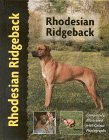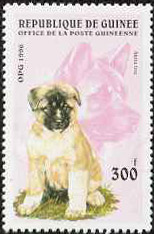
Rhodesian Ridgeback
Rhodesian Ridgebacks get their name from the ridge of fur along their spines. They are hunting and guard dogs, sometimes classed as hounds, but more territorial than most hounds. As with other natural guard dogs, it's safer to socialise them as much as possible with people from when they are pups, with ongoing socialization throughout their lives, so that their natural guarding instinct doesn't turn into aggression against people you would rather they were friendly with.
These dogs have the independence of hounds, so they need consistent training from when they are pups. They also need a lot of exercise. A Rhodesian Ridgeback which is bored and isolated can be very destructive in the home. Walks can be a problem because they can become dog aggressive as adults, even after careful socialization. However, a combination of socialization, obedience training, and defensive walking, can help keep the dog out of trouble. Obedience training should include excellent recall, to be able to call the dog back if he looks like he is planning mischief, while defensive walking includes avoiding areas where there are a lot of dogs, especially ones that might plague a Rhodesian Ridgeback on the lead.
Are they good with children? Not especially. Rhodesian Ridgebacks aren't very tolerant of being teased or handled roughly. They can get on well with sensible, older children who understand dogs.
This breed is generally reserved with strangers, and is bold, so is unlikely to back down if an uninvited visitor comes into your house. It's important to ensure that this combination of wariness and boldness doesn't lead to aggression, since the visitor could be a child.
Rhodesian Ridgebacks aren't especially barky, and they don't need a lot of grooming. They are tough dogs, able to handle big changes in temperature, but they are likely to develop behavioural problems if they are left outside alone as guard dogs, and in any case, leaving them unsupervised in the garden could create problems if they escaped or a child wandered into the garden.. Common health problems include hip and elbow dysplasia, hypothyroidism, cancer, bloat, dermoid sinus, and cysts.
Ann Chamberlain has a long involvement with Rhodesian Ridgebacks, and has drawn on her experience in producing a book especially suited to pet owners. The character of this very special breed comes across clearly, as does her love for Rhodesian Ridgebacks. This guide is clearly written, so would suit novice Ridgeback owners, and has enough information to interest existing owners.



